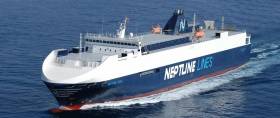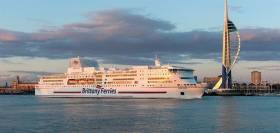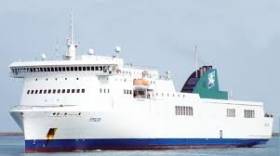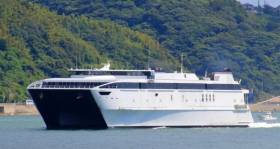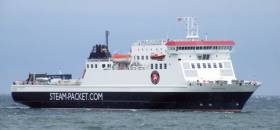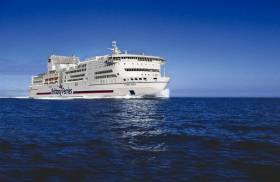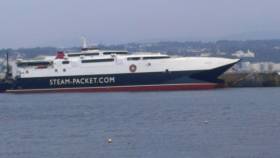Displaying items by tag: Ferry news
Greek Charter Draws to A Close on P&O Dublin-Liverpool Service
#GreekCharter - The charter of a Greek vessel to P&O Ferries to cover dry-docking of the one of three ropax ships on the Dublin-Liverpool is drawing to a close, writes Jehan Ashmore.
Piraeus based Neptune Lines, a vehicle logistics operator have their Neptune Aegli operating in place of P&O’s European Endeavour which is at Cammell Laird, Birkenhead for annual overhaul.
The Spanish built European Endeavour is scheduled to re-enter service tomorrow with an arrival to Dublin in the morning. It is expected the 366 passenger / 112 lorry ropax will appear with a modified version of the traditional P&O livery scheme already introduced on the route's Dutch built sisters, Norbank and Norbay. The pair are also ropax's having been built originally for North Sea service.
While the ‘European’ is away, the 1,550 freight vehicle lane metre capacity Neptune Aegli presented a sleek looking profile. The ship built in 2002 is not a ropax but is designated a Pure Car & Truck Carries (PCTC) which can transport 1,800 car units. Neptune Lines has operations in 20 countries and more than 30 key ports, focusing on the Mediterranean and Black Sea.
Brittany Ferries Invest €17m in 'Green' Technology on Pont-Aven
#CutEmissions - Brittany Ferries has invested €17 million to cut fuel emissions from its flagship Pont-Aven with the installation of exhaust gas cleaning systems.
As previously reported on Afloat, Pont-Aven is unique in that it is the only ferry operating in Irish waters in 2016 to be fitted with “scrubbers”, which dramatically reduce sulphur emissions to almost zero and significantly reduce particulate output.
Hugh Bruton, General Manager of Brittany Ferries Ireland said, “As a company, we have a profound respect for the environment and we have made a significant investment to ensure that our passengers will be travelling on the cleanest and most environmentally-friendly ship to operate in Irish waters this year. The installation of the scrubbers is just one of a number of steps that we have implemented as we strive to achieve sustainable tourism.”
The scrubbers were installed at the renowned Gdansk shipyard in Poland, before the commencement of the 2016 Cork-Roscoff sailing season earlier this month. The work on the Pont-Aven marks the completion of a major €80 million project over 18 months by Brittany Ferries to significantly improve the environmental performance of its six-strong car ferry fleet in Ireland and the UK.
Mike Bevens, Group Commercial Director at Brittany Ferries added, “Today we are still largely owned by the collective of French farmers who launched the company more than 40 years ago, with the aim of linking territories and improving trade. These aims have always been framed by a will to respect the environments in which we operate and this significant investment is testament to our on-going commitment.”
Brittany Ferries implements various measures to reduce the impact of its operations and to support organisations that promote conservation work including:
Cutting CO2 emissions while sailing
Brittany Ferries operations are planned to minimise fuel consumption, by reducing speed on overnight crossings. The effects of tides and the wind are also harnessed to optimise fuel efficiency.
Our water discharge policy
The Pont-Aven is fitted with water treatment units so that uncontaminated water is discharged to sea, and at a minimum of 12 nautical miles from the coast. Polluted water is stored on board, then discharged on shore, to be disposed of by certified waste disposal contractors.
Using anti-fouling paints
Brittany Ferries uses the latest silicon-based anti-fouling paints to coat the submerged parts of hulls. These are low in toxicity and also enhance flow through the water, aiding fuel efficiency and thereby reducing CO2.
Conservation work
The Pont-Aven is taking part in the longest running marine biological survey in the world, towing continuous plankton recorders (CPR) for SAHFOS. Brittany Ferries also works with whale and dolphin charity ORCA. Wildlife officers are hosted on the Pont-Aven throughout the summer to monitor and report on whale and dolphin sightings though the Bay of Biscay. This helps government fulfil its obligations under the Habitats Directive, but also supports conservation work to protect these beautiful sea creatures.
The Pont-Aven continues to offer the fastest direct ferry crossing from Ireland to France, taking just 14 hours and operating to a convenient weekend schedule. The state-of-the-art ship is the newest and most modern ship to be found on any direct crossing between Ireland and France. Passengers onboard enjoy unmatched cruise style standards and award-winning service and cuisine. Facilities include pool and bar areas with panoramic sea views, two cinemas, shopping malls, luxurious spa treatments and a wide range of restaurants, as well as complimentary Wi-Fi in all public areas of the ship.
Epsilon Three Years On Is Due Back Fresh From Overhaul
#Epsilon - Epsilon the ropox which has been on charter to ICG’s division Irish Ferries since 2013, is nearing completion of routine maintenance dry-docking at A&P Falmouth, writes Jehan Ashmore.
The 26,375 ton Epsilon is in dry-dock No. 2 while those sailings rostered by the ropax on Irish and French routes remain cancelled. The ferry is however scheduled to re-enter service next Saturday, April 23 on the Dublin-Holyhead. In addition to operating the Dublin-Cherbourg route that weekend with the oubound sailing from the Irish port also next Saturday.
Epsilon completed in 2011 is one of the popular and proven Visentini ropax class series designed by the Italian yard. Primarily, the ropax concept is to carry large amounts of ro-ro freight vehicles and not catering for high passenger capacity. In the case of Epsilon the passenger certificate is only for 500 passengers and accommodation based on 2 and 4-berth en suite cabins.
The 2.8km in freight vehicle deck lane metres of the Epsilon has contributed in boosting the fortunes of ICG, notably by increasing midweek capacity on the Irish Sea’s premier Dublin-Holyhead in support of daily sailings by Ulysses and high-speed craft, Jonathan Swift.
Passenger facilities on Epsilon are limited and so the marketing of the vessel on both routes are based on an 'economy class service'. Compared to the luxurious Oscar Wilde, where the cruiseferry has extensive amenities to offer on the Rosslare-Cherbourg route already underway. Next month 'Oscar' is to resume the summer-only Rosslare- Roscoff route.
Epsilon's Irish career has also covered sailings during annual dry-docking of Oscar Wilde on the Rosslare-Cherbourg service. On occasions the ropax has taken on additional business in transporting trade vehicles discharged at the Wexford port.
Irish Ferries Owner Acquire Fast-Ferry for $13.25m
#ICGbuyFerry - Irish Continental Group (ICG), parent company of Irish Ferries has agreed a deal to buy a high-speed vessel known as the “Westpac Express” for $13.25 million.
The Irish Times reports that ICG expects to take ownership of the fast-ferry from current owner Bali Westpac by late May.
Upon delivery, the vessel is to be bareboat chartered to the company Sealift for a firm period of four months with four further one year option periods and a final seven month option at the charterer’s option.
The Westpac Express was built in 2001 by Austal Ships. It has a gross tonnage of 8,403 tonne, passenger capacity of 900 and a car carrying capacity of 182 units.
Scottish Arran Route First for New Mobility Access Trial
#FerryMobility – Caledonian MacBrayne (CalMac) ferries to the Isle of Arran on the Forth of Clyde are trialling a new booking system that should improve the travelling experience for passengers with mobility problems.
The operator is testing a new reservations procedure on the MV Caledonian Isles and the MV Isle of Arran that will prioritise car spaces for people who need access to the lift from the car to the passenger deck. Two car deck spaces have now been identified next to the lifts specifically for wheelchair users and passengers who have difficulty walking.
The project trial was devised by CalMac's Ardrossan port manager, Colin McCort and Customer Operations Support Manager, Rosalind Robertson.
"Currently, we do not have a system in place that allows us to prioritise people who have difficulty getting around. By designating specific car spaces those people will now be able to exit their vehicle directly into the lift that takes them to main deck. Sailing, by its nature, presents barriers to people with mobility issues but this is another small step toward improving the travelling experience for all our passenger whatever their needs," explained Rosalind.
Customers who need mobility assistance when booking on the Ardrossan-Brodick route should now book directly through Customer Contact Centre's freephone number 0800 066 5000 to reserve their space.
The North Ayrshire Access Panel was closely involved in the development of the new booking system.
"The panel members were pleased to be approached by Caledonian MacBrayne to assist in the development of this new system. This is a welcome improvement for passengers that need a bit more help when sailing. We look forward to continuing our work with CalMac on this and other projects," said Panel chairman, Peter Joyce.
The new system will also allow marshals to identify which vehicles are to be prioritised dockside and direct them to specific waiting spaces.
"After closely monitoring the success of this trial we can hopefully roll it out across the network for all vessels with lift access," added Rosalind.
Failed Part Delayed Manx Fast-Ferry Arrival
#Fastferry - Manx Radio reported yesterday, that the Isle of Man Steam Packet said it was a failed hydraulic fitting that was one of the reasons for a delay of their (Sunday) night Manannan sailing from Liverpool. According to the operator, repairs were made overnight.
Assistance was needed and it took some time for the vessel to berth safely in Douglas Harbour.
It was among a number of factors that delayed the boat.
In a statement issued by the Steam Packet, it says the failed part meant one of the engines could not be used for manoeuvring purposes - despite the engine itself being fully functional.
This - combined with strong, gusting winds and a French warship (see recent visitors to Dun Laoghaire) moored on the adjacent berth - meant the Captain required help from a tug.
Afloat adds that sailings have since resumed and continue to operate along with a freight-only ferry while ropax Ben-My-Chree began a three-week overhaul today.
Isle of Man Steam Packet Ropax to Have Biennial Overhaul
#Overhaul - The Isle of Man Steam Packet Company ropax Ben-My-Chree is from tomorrow (12th April) to begin a biennial overhaul.
The 12,504 tonne ferry, which has served the Isle of Man for 18 years, will go into dry dock for three weeks for the scheduled ‘service’.
Work will include a technical overhaul as well as refurbishment of some of the passenger areas, including improvements to the seating, general decor and lighting in the Executive, Niarbyl and Premium lounges. The vessel is due to return to service on 4th May.
During the overhaul MV Arrow, which the Steam Packet Company currently has on charter, will provide freight services. Fast craft Manannan will operate passenger services with a schedule which was published last autumn.
From 12th April until 3rd May inclusive sailings will depart Douglas for Heysham at 08.00 and for Liverpool at 15.00, with the return sailings departing Heysham at 12.00 and Liverpool at 19.15. The only exceptions will be on 20th and 27th April when Manannan will operate the Belfast route instead of Heysham.
A coach service will be provided at Heysham to transfer foot passengers to and from Lancaster railway station.
Chief Executive Mark Woodward said: ‘It is a statutory requirement that Ben-my-Chree undergoes a technical overhaul every two years, and also an opportunity for us to invest in upgrading the facilities for passengers and crew.
‘This does mean the vessel is unavailable for three weeks, requiring some changes to our sailings during this period. We published Manannan’s revised schedule last autumn to give as much notice as possible and will assist foot passengers travelling onwards via Heysham by providing a coach to and from Lancaster station.
‘Freight services will be provided by MV Arrow, once again underlining the value to the Island of the significant investment we are making to retain the vessel.
‘Ben-my-Chree will be back soon, fully serviced and ready for another busy summer season.’
Cork-Roscoff Ferry Uniquely Features 'Scrubber' Technology Part of €60m Green Fleet Investment
#UniqueIrishFerry - As previously highlighted on Afloat.ie, Jehan Ashmore reported on the planned installation of 'scrubbers' of Brittany Ferries flagship Pont-Aven during the winter which have since been installed prior to the cruise-ferry's return to open this year's seasonal Cork-Roscoff route.
The installation of the scrubbers (compare posting images) in essence are funnel emission reduction systems so to comply with the EU Directive on Sulphur Emissions.
Pont-Aven is unique in that she is the only ferry operating in Irish waters fitted with sulphur emission scrubbers. This is because the ferry also plies on the Roscoff-Plymouth route in the English Channel, one of several SECA (Sulphur Emission Control Area) geographical zones in northern Europe that are under the EU directive to curb on emissions. The Irish Sea nor surrounding waters are not subjected to the sulphur directive zones.
The work on the 2,400 passenger Pont-Aven mark towards the final phase in a major £60m environmental programme by Brittany Ferries to improve significantly the environmental performance of its six-strong car ferry fleet. The scrubbers on the flagship were installed at the Gdansk shipyard and engineers from the Polish yard will be fine-tuning the system over the next few weeks.
These vast and technically-complex exhaust systems strip sulphur from funnel emissions and significantly cut particulate output.
In terms of appearance, Pont-Aven's single uptake arrangement has been retained, however there is now a twin scrubber arrangement with one unit on each side of the original funnel.To disguise the emission technology a new screen wraparound structure (almost the width of the ship) forms this much larger new funnel.
Another cruiseferry Armorique which Afloat reported on while during a November crossing covering the Caen (Ouistreham)-Portsmouth route to enable Mont-St. Michel to have scrubbers installed in Spain at the Astander yard, has returned to the routine Roscoff-Plymouth route. Collectively, the investment on the Pont-Aven (which also operates UK-Spain routes) and Armorique is around £30m.
Scrubbers were also installed last year on the Portsmouth routes second ship Normandie. As for the scrubbers of Mont-St. Michel they too were engineered at the Astander yard located in Santander and the design allows passengers to see the complexity of the internal works for themselves.
"As a company we are proud of our reputation as guardians of the land and stewards of the sea," said Mike Bevens, Brittany Ferries group commercial director. "Today we are still largely owned by the collective of French farmers who launched the company more than 40 years ago, with the aim of linking territories and improving trade. These aims have always been framed by a will to respect the environments in which we operate and this significant investment is testament to our on-going commitment."
Barfleur, which sails the Poole to Cherbourg route and Cap Finistère which carries passengers across the wildlife-rich Bay of Biscay en route to Spain also benefit from the emission-reduction technology.
Cutting air quality emissions is just one way in which Brittany Ferries claim to be working to reduce the impact of its operations - and to support organisations that promote conservation work. The environmental measures are outlined below.
Cutting CO2 emissions while sailing
Brittany Ferries operations are planned to minimise fuel consumption, by reducing speed on overnight crossings. The effects of tides and the wind are also harnessed to optimise fuel efficiency.
Taking freight traffic off the roads
We are part of the motorways of the seas programme. Last year we carried nearly 200,000 freight vehicles. According to an EU calculation, the external costs of travel by sea are nearly four times lower than for freight transport by road.
Water discharge policy
All vessels are fitted with water treatment units. Only uncontaminated water is discharged to sea, and at a minimum of 12 nautical miles from the coast. Polluted water is stored on board, then taken to shore, to be disposed of by certified waste disposal contractors.
Using anti-fouling paints
Brittany Ferries uses the latest silicon-based anti-fouling paints to coat the submerged parts of hulls. These are low in toxicity and also enhance flow through the water, aiding fuel efficiency and thereby reducing CO2.
Low emission vehicles
On land we take our environmental responsibilities seriously too. Examples include our participation in the plugged-in fleets initiative in the UK, and through plans to include electric charging points for cars, for example at Portsmouth Port this year.
Conservation work
Our ships are taking part in the longest running marine biological survey in the world, towing continuous plankton recorders (CPR) for SAHFOS. We are also proud to work with whale and dolphin charity ORCA. Wildlife officers live on our ships throughout the summer to monitor and report on whale and dolphin sightings through the Bay of Biscay. This helps government fulfil its obligations under the Habitats Directive, but also supports conservation work to protect these beautiful sea creatures.
Contract Signed for Four New Stena RoPax Ferries
#RopaxOrder - An order for four new RoPax ferries subject to Stena board approval by end of April are planned for delivery during 2019 and 2020, with an option for another quartet of vessels.
The vessels will be optimized for efficiency and flexibility and will be built by AVIC Shipyard in China. The intention is that the four initial vessels will be used within Stena Lines route network in Northern Europe.
“We are very pleased that Stena have signed a contract for four vessels with an option for another four. During the course of the past 24 months our engineering staff has managed to develop a design that is not only 50% larger than today’s standard RoPax vessels, but more importantly, incorporates the emission reduction and efficiency initiatives that have been developed throughout the Stena Group during the past years. These ships will be the most fuel efficient ferries in the world and will set a new industry standard when it comes to operational performance, emissions and cost competitiveness, positioning Stena Line to support its customers in the next decades”, says Carl-Johan Hagman, Managing Director of Stena Line.
The vessels will have a capacity of more than 3 000 lane meters in a drive-through configuration and will accommodate about 1 000 passengers and offer a full range of passenger services. The main engines will be “gas ready”, prepared to be fueled by either methanol or LNG.
“With this investment we are building on our successful RoPax concept mixing freight and passengers. Through standardization we secure a reliable operation and through flexibility we can provide an even better support to our customers and help them to grow”, says Carl-Johan Hagman.
“We foresee a continued demand growth for short sea services in Northern Europe and in many other parts of the world. Ferry transportation will play an essential part in shaping tomorrow’s logistics infrastructure if we are to have sustainable societies. Not only is transportation on sea the most environmentally efficient way of moving goods, it is also infrastructure that provides reliable and speedy logistics with very limited public cost. Through this investment we prepare Stena Line for further growth”, says Dan Sten Olsson, Chairman in Stena Line.
#FastFerryReturns - It was a welcome sight as the Isle of Man Steam Packet fast craft Manannan returned to service.
The IOM Today reported that the fastferry resumed her normal spot berthed beside Victoria Pier, Douglas at 10.30 am on Sunday.
The vessel had been in dry dock at Cammell Laird shipyard in Birkenhead since Tuesday, for extensive repairs to her central hull.
It was damaged when the craft hit Victoria Pier on approach to Douglas harbour on the night of March 23.
For more on the story click here


























